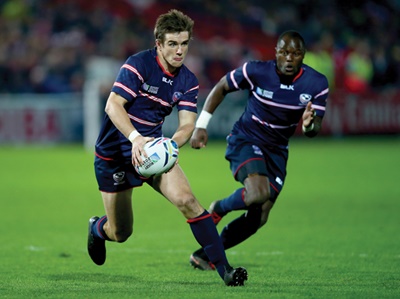New York sports venue financier Douglas Schoninger is at least the third person in the last year to develop plans for an American professional rugby league. But unlike the other two efforts, he has the full cooperation of USA Rugby.
As of Nov. 23, Schoninger’s PRO Rugby league had announced just two of the planned six teams, Sacramento and San Francisco, but he promises a 10-game inaugural season will start in April. The other four cities are still to be announced, along with the identity of coaches, players, sponsors and any media partners.
 |
The lack of a pro league is seen as a strategic weakness for the U.S. team.
Photo by: GETTY IMAGES
|
“I’m actually enjoying the skepticism, because when I prove them wrong I’m going to own them more,” Schoninger said of his doubters. Schoninger was previously managing partner of Stadium Capital Financing Group.
Both USA Rugby and World Rugby have sanctioned the league, allowing it to sign international players. The domestic governing body also will assist in player contracting, referee development and marketing, said USA Rugby CEO Nigel Melville.
“The key thing on professional rugby for us is having our players in a full-time training and playing environment,” Melville said. “That will in turn help all our players on the national team. It’s important to get our players into that environment.”
Startup leagues are under no obligation to seek governing body sanctioning, but efforts can easily get off track without it. The Minnesota-based National Rugby Football League has canceled two exhibitions this year, one due to lack of sanctioning. United World Sports is raising capital to launch its unsanctioned Super Sevens rugby league, but that won’t launch until 2017 at the earliest and USA Rugby has granted development rights to a separate group for the pared-down Sevens version of the sport.
Melville called the lack of a pro league a strategic weakness for the U.S. team, which lost all four matches at the Rugby World Cup this fall.
PRO Rugby is a single entity, owned entirely by Schoninger, and the teams ideally would be operated by venues. For instance, the Sacramento team will play at 11,000-seat Bonney Field, home to the United Soccer League’s Sacramento Republic FC, and be operated by Spectra, the venue management firm that runs the facility for Cal Expo.
Teams will have 30 players, Schoninger said, composed of up to five international players, members of a Canadian/American player pool and local club players. The league will coordinate salaries with USA Rugby for the players in their system, Schoninger said.
Schoninger says four coaches have agreed to join the league but have not been announced.
Time is of the essence for rugby entrepreneurs. They’re counting on the sport’s return to the Olympics in August to catalyze fan interest, and leagues not able to advertise a real presence by then will risk missing the narrow window of Olympic-generated hype.
PRO Rugby is targeting smaller venues than the other two leagues, and Schoninger said his sponsorship and media strategy is based around Facebook, not television. That fits the modern era, he says, and is more sustainable and manageable until the game becomes more popular in the U.S.
“Domestically, it’s quite a small sport, and I want to be at the level we’re at right now and then grow,” Schoninger said. “If you start too big, you just topple over.”
Along with Sacramento and San Francisco, Schoninger promises two teams on the east coast, one in the Rocky Mountains and one to-be-named location. Vancouver was slotted for the last location, but Canadian Rugby sanctioning is still a year away, the league’s original media release reads.




